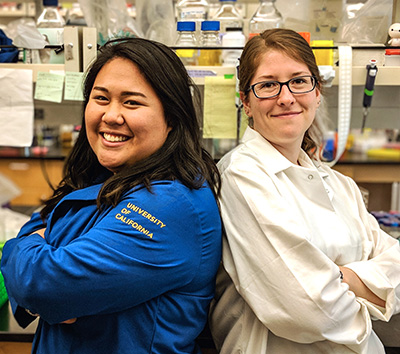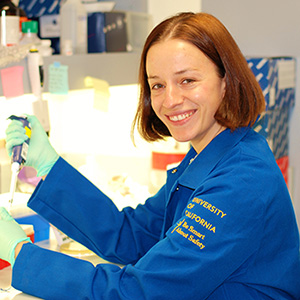Campus News
State program funds lung cancer research at UC Santa Cruz
The California Tobacco-Related Disease Research Program has awarded $1.8 million in grants and fellowships to UCSC biomedical researchers.



Biomedical researchers at UC Santa Cruz have won major funding to investigate lung cancer and chronic obstructive pulmonary disease (COPD) from the California Tobacco-Related Disease Research Program, which is supported by the state tax on cigarettes.
The awards include a $935,000 grant for research on lung cancer led by John MacMillan, professor of chemistry and biochemistry, and a $550,000 grant for research on COPD led by Susan Carpenter, assistant professor of molecular, cell, and developmental biology. In addition, Carrie Tambo and Alison Barrett, both graduate students working with professor of chemistry and biochemistry Seth Rubin, were awarded 3-year predoctoral fellowships of $180,000 each.
MacMillan’s lab studies natural products derived from marine microbes, isolating and characterizing novel chemical compounds and investigating their therapeutic potential for treating cancer and other diseases. The new funding will support his research on marine natural products that show selective activity against lung cancers arising in nonsmokers. Lung cancers in nonsmokers have different genetic mutations than those in smokers and respond differently to drugs. MacMillan hopes to identify chemical agents that can be developed specifically as therapies for lung cancer in nonsmokers.
Carpenter’s lab studies the role of the innate immune system in diseases involving inflammation. Smoking is the leading cause of COPD, a debilitating lung disease involving chronic bronchitis and emphysema. Carpenter will investigate molecular signals involved in the response of immune system cells called macrophages to cigarette smoke, and how this impacts COPD. In particular, she is interested in the role of RNA molecules known as long non-coding RNAs (lncRNAs). This work will provide insights into how innate immunity is affected by cigarette smoke, shed light on the pathogenesis of COPD, and potentially point to novel ways to treat this disease.
Barrett and Tambo will use their funding to support research projects involving tobacco-related lung cancer. Barrett is interested in a protein called E2F that turns on certain genes and is overactive in all forms of tobacco-related lung cancer. She will investigate a novel approach to controlling E2F which could have potential for development into a treatment for lung cancer. E2F is part of a signaling pathway that regulates cell division via the Retinoblastoma tumor suppressor protein (Rb). Tambo’s project focuses on understanding the molecular mechanisms involved in the Rb signaling pathway, specifically the activation step necessary for cell division. By determining structures of Rb protein complexes, she aims to help identify new inhibitors for treatment of tobacco-related lung cancer.